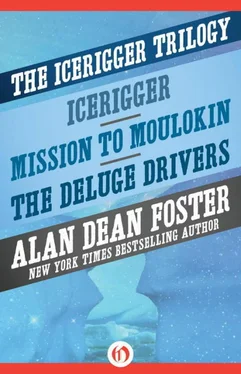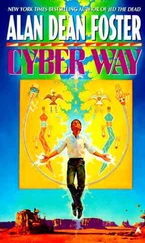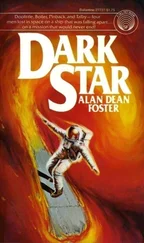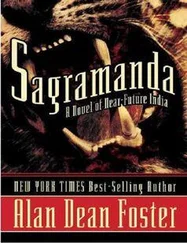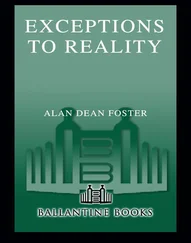Built of stone and metal so solid that it supported the cumulative weight of dirt, rock and structures above it, the dome was filled with engravings and mosaics which proved conclusively most of William’s assumptions.
“You were not entirely correct, my friend.” Eer-Meesach ran a gnarled finger across one wall bas-relief. “The yellowish grass does not drive out the pika-pina but rather is a warm weather variety of it, as the Golden Saia are warm weather versions of us Tran.”
Williams was examining the carvings, nodding slowly in agreement. “Probably the nutrients concentrated in the pika-pina and pedan are moved landward and help to revive the dormant grasslands.”
“But what are these?” The elderly wizard indicated a profusion of small carvings, each different from the next. Remnants of ancient dyes still clung to the bare stone.
“Do you not remember them from the land of the Saia?” said Elfa. She turned to Ethan. “What did you call them?”
“Flowers.” He walked over, avoiding rocks and broken stone which littered the floor. “So the pika-pina flowers before it gives way to the grasses. Milliken, maybe every creature that flies, swims or chivans on Tran-ky-ky has both cold-and hot-climate varieties. That creature on the wall over there, isn’t that a stavanzer?”
“No,” Hunnar insisted from nearby. “Those strange things on its front—”
“Gills!” Ethan shouted it. “The stavanzer does look vaguely like a beached whale. Dormant gills don’t show themselves until the oceans turn to water. A stavanzer could never support its own weight on land.”
“I’m sure,” added Williams, “that the creature could exist as an amphibian for as long as was necessary to complete the transition to a watery existence.”
“I would much like to see these things you call ‘ghuls’.” Hunnar took a knife from his belt, handed it handle-first to Williams. “Go and kill a stavanzer and I will help you do the looking inside.” Laughter human and Trannish resounded in the chamber, producing echoes that were anything but eerie.
A week later the Slanderscree was filled with a cargo as unusual as it was diverse. There were hundreds of kilos of carvings, artifacts, sections of mosaic and wall. Enough proof of Tran-ky-ky’s erratic history both sociological and climatological to convince the stubbornest bureaucrat or Landgrave of The Truth.
September and Ethan were once again discussing the Tran’s future and history as the last of the cargo was secured in the spaces within the deck.
“Likely in the Saia mode all the Tran lived together on a few continents, lad,” the giant said. “Raisin’ a new civilization until the cold wiped it out, forcing ’em to disperse to the islands to survive. The harsher the climate, the more territory it generally takes to support folks.
“Now that we can prove they all used to live together and cooperate, it ought to be easier to get ’em to do it again.” He punctuated the comment with a reverberant grunt.
When they produced the evidence many days later, back in the steaming lands, the Golden Saia accepted the unarguable with typical lack of visible emotion. Their words betrayed their true excitement. Here was proof of most of their legends, solidified with a knowledge hitherto unsuspected. Listening to the legend-spinners, Williams and Eer-Meesach were able to fill in portions of the history that silent stone and walls had been unable to tell.
In contrast to their difficult ascent of the canyon, returning was mostly a matter of keeping the ship on a single heading. Motive power was no longer a problem, not with the wind off the plateau shoving insistently at their stern.
On reaching the edge of the ice, the captain brought the ship to a halt, whereupon Hunnar and a small group of sailors chivaned off toward Moulokin. They were expected to return with shipwrights, cranes and tools to aid in removing the wheels and axles and to help speed the installation of the five massive duralloy skates.
Their arrival in that busy shipbuilding city provoked a good deal of surprise. Neither the Landgrave Lady K’ferr, minister Mirmib, nor any of the others who knew where the Slanderscree had gone ever expected to see her crew again. They were certain the spirits of the dead who lived in the great high desert would claim the healthy bodies of the sailors for their own, to enable them to wander the spirit lands in more corporeal form.
Sir Hunnar’s hurried, none-too-precise explanations of what they’d uncovered created more confusion than enlightenment. He finally gave up trying to explain something he didn’t fully comprehend himself.
The following day he returned to the landlocked Slanderscree, accompanied by a large party of craftsmen from the city’s yards. Eer-Meesach provided a better explanation of their discoveries. Thus assured of old friends and a new heritage, they set to work making the great raft iceworthy again.
“What of the fleet from Poyolavomaar?” Ethan hesitantly interrupted the chief of the Moulokinese work crews.
The burly Tran left the final installation of a duralloy runner to his colleagues. “They remained a ten-day after your departure to the land of the Golden Saia, Sir Ethan, thence departed themselves. There have been but few ships put in to Moulokin since. None report sighting them, though two mentioned a large number of runner tracks extending northeastward.”
“Toward Poyolavomaar.” Ethan couldn’t quite convince himself that mad Rakossa and Ro-Vijar of Arsudun had conceded so quickly, despite this evidence to the contrary.
“’Tis so. Nor have any of our own vessels seen signs of them, though two still search further out to make certain they have truly taken their leave. ’Tis safe I think to say that, finding you not here, they betook themselves elsewhere.”
“I doubt that.” Ethan looked around to see who agreed with his own private opinion. Teeliam Hoh watched the repositioning of the fore portside runner, while the crew leader watched Teeliam. Her thoughts, though, were not on the delicate operation taking place over the side.
“Tonx Rakossa would not leave me alive while he remains so. While I live free, his thoughts will be on naught else.”
“Maybe he and Ro-Vijar had an argument,” Ethan half-joked, “and he lost.”
“I hope not.”
“What? But you’ve said…”
She stared at him, cold cat-eyes dark as the waters beneath the ice sea. “If he should be slain by someone unknown, far from here, if he should perish before we again meet, then I will be barred the delicious opportunity of killing him myself.” She spoke calmly, as if discussing the most ordinary, obvious thing in the world.
“Of course. I should’ve thought of that.”
She continued to stare at him, her head cocked slightly to one side. “You fancy you know us, do you not, Sir Ethan?”
“Know you?” Ethan felt glad of the expression-distorting face mask and the goggles behind. “Teeliam, I’ve lived among you for more than a year now.”
“’Tis true then, you indeed believe you know us. I’ve seen it in your gestures, in the way you converse with your companions from this distant land of Sofold. But you do not understand us. When I spoke of killing the Thing, it showed in your body and your way of forming words.
“You are…” she paused, half-smiled, “much too civilized, in the sense I believe you use that term. For all that you have shared with such as the magnificent Sir Hunnar and my good friend Elfa, they are still not part of you, nor you of them. They are part of me and this world. You will never change that.” There was pride in her tone, and a hint of arrogance.
“Perhaps not.” He knew better than to argue with such a recalcitrant customer. “I can only try to help as best I can, the people I’ve come to care for so strongly.”
Читать дальше
